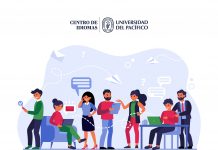Almost three years of undergoing the Coronavirus 19 pandemics constituted a tremendous challenge for educators which forced us to go through an experience that made us resilient, stronger, and more creative. Now that the health situation is normalizing, should we forget what we learned during this fateful period and do everything the same way we used to before? or would it be better to walk forward using the knowledge acquired? I would categorically opt for the latter since that will enable us to develop more skills to maintain ahead of the changes that keep coming.
Easier said than done.
One of the things that for many became open to doubt in virtual teaching was the employment of the textbook. How to use it? Now, back in the classroom, it might be worth it to give it another thought. You would probably agree with me in that selecting a textbook is hardly ever our prerogative as teachers, although it probably should. If we had a saying in choosing one, it possibly would be more adequate for our students´ needs. However, we don´t, so we need to get the best of it.
Using textbooks has many advantages. Some may be:
- They can be a guide for us. Knowledgeable people are behind the elaboration, so we must value that.
- They can be useful to help students keep up with what we do in class.
- They can be a guide for students, especially for the ones that need to review the content again and again.
- They provide many visual aids, with the advantage of having a sequence and be connected to the topic we are covering.
Any other advantage of having a textbook for our classes?
Using textbooks has definitely many more advantages, but that does not mean that we have to teach by the book, does it?

When life gives you lemons, make lemonade.
As I mentioned earlier, we need to move forward using the knowledge acquired. Something I have learned is that we must take advantage of every single thing available to us. Regarding the disadvantages that having a book may entail, why don´t we try to make lemonade out of it.
Disadvantage 1
The book has been made to be used in different countries.
This is a very common feature, and schools try to choose the book that meets their objectives more closely. We, teachers just have to use it.
Teaching following the textbook meticulously has never been the best advice, unless one is completely unexperienced or hasn´t followed any methodological studies and needs to be guided. Instead of skipping the sections which do not match with our Peruvian reality, for instance, we could use the context used as a reference to compare different realities and take the lesson beyond the description of what comes in the irrelevant unit. Let´s say the section contextualizes sports in Germany and describes how to play German curling or Eisstockschiessen. We may skip the unit or use it to have our students find out the sports that are similar and discuss the features that for example make it possible to play it. We can have them look for information if there are places with similar features in South America first, and then in Perú. This sport is traditionally played on an ice surface, so students will learn that fun can happen anywhere. We could even connect this context to the topic of global warming and go beyond learning about other cultures and move to have them take a position in what role they play in caring for the planet.
Thus, instead of skipping the unit, we may omit only some parts of it and insert what will motivate students more. Having students use internet to expand their current knowledge and come ready for the class with facts, curious realities, pictures or anything else will encourage them to use the skills gained during pandemics.
Disadvantage 2
The textbook develops grammar in unnatural order. Although many books have improved a lot in that sense, there may still be books that, to our judgment, introduce the structures students may need to communicate in an order too exacting. Having a certain sequence is necessary, mainly because we do not want to overburden students with expressions that are too complex to construct. Just as when we learned our native language, learning another language requires covering the basics first and, as experience with the language is gained, more complex structures and more sophisticated vocabulary can be acquired. This experience with the language should come through reading or through exposure to audio or video. The more you know about what there exists, the more likely you are to learn it and use it.
The problem is when we want to teach complex structures too early. The same happens when we want to teach the pronunciation of sounds which are very difficult to produce because they do not exist in our language. If, during the lesson, the student wants to express something and does not know how to do it, usually the teacher explains and with that the temptation may arise to elucidate the grammar behind it. If they have not yet mastered the structures which would facilitate the understanding of the more complex one, let us not try to explain it yet. What we should do is present it as a set of words (“chunk”) and let them learn it that way. In the case of pronunciation, we do have to teach how exactly the sound is produced and point out that it requires practice to articulate it properly. In this case, the patience of both pupil and teacher will have to be called upon to wait, little by little, for the sound to be enunciated correctly. It is worth noting, that in this case we should always be careful to provide correct input whenever we hear someone mispronounce. Not by pointing out the error, but only by repeating the word or phrase with the correct pronunciation or intonation as the case may be.

Basically, what I would like us to remember is that textbooks exist because they are part of our system and they may or may not be very useful, but that is why we teachers are there to make decisions to ensure language learning. Even if we are not consulted to procure a series, we teachers can still decide what the best way is for our students to achieve their goals. Besides, let’s not forget that the textbook, as well as any other ancient or modern tool, is just that, an instrument, and we with our pedagogical knowledge decide how, when and what to use. Nobody knows better than us what should be done. Let us not forget this beautiful role we have in the lives of our pupils. We are on their side and that is why we will always look for the best way to help them achieve their goal: learning a language.
ººººº
Are there any other disadvantages? How have you dealt with them?
Share your ideas with us!










